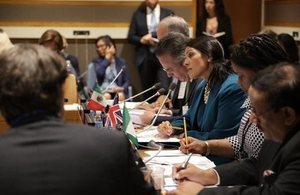International Development Secretary calls for vital reform of the United Nations.
The International Development Secretary has called for urgent reforms to keep the United Nations relevant in the 21st century.

Priti Patel at the UN Reform event at UNGA. Picture: Anna Dubuis/DFID
The International Development Secretary, Priti Patel, has warned that the United Nations system is simply not adapted to the challenges of today, in the face of unprecedented humanitarian challenges, protracted crises and mass displacement.
This frank warning came at the UN General Assembly, at a UK-led event on reforming the development system. At the event, Priti Patel supported the strong reform agenda of the new Secretary General, Antonio Guterres, and urged him to be bold in demanding changes to ensure the organisation better delivers for the worlds’ poorest.
The International Development Secretary, Priti Patel, said:
Against the backdrop of unprecedented humanitarian crises, the international system is, frankly, not coping - it’s not fit for purpose.
While the objectives and goals of the UN are timeless, the structures and system we have today was cobbled together over years, and it is time for change.
Nothing emphasises these problems like the sickening and atrocious sexual abuses carried out under the UN flag – it will not be tolerated.
The UK is putting our money where our mouth is, and to ensure these critical reforms are not ignored, a third of our spending will be dependent on UN agencies making the changes needed to remain relevant in the 21st century.
The current UN system is hampered by a multiplicity of agencies, organisations, funds and programmes, unable or unwilling to collaborate, share resources or embrace innovation. Worst of all, despicable child rape, sexual exploitation and abuse has been carried out under the UN flag by peacekeepers and in peace operations.
The International Development Secretary announced that from next year almost a third of DFID funding to UN agencies will be dependent on improved results and progress on reform priorities:
-
UN agencies will have to demonstrate effective collaboration, greater transparency and accountability.
-
For all major emergencies, agencies will have to demonstrate that effective accountability and feedback mechanisms are in place.
-
We will demand more effective and efficient delivery of assistance to the vulnerable - including greater use of cash transfers. Cash, rather than flying in food and other supplies, is more efficient, it enables those in need to choose how to support themselves. Crucially, it helps build local markets.
-
We are also calling on the UN to collaborate more closely with the private sector, the engine of job creation around the world.
The International Development Secretary also made a stark call to put the stamping out of child sex abuse and child rape at the top of the UN’s agenda. This followed confirmation by the UN Secretary General in March that UN peacekeepers and civilian staff faced allegations of over 140 cases of sexual exploitation and abuse this year.
She stated in no uncertain terms that UN agencies must be fully transparent about any and all accusations made against their staff, contractors and implementing partners.
The British government puts the protection of children from rape, sexual abuse and sexual crimes at the top of its priorities. Any agency that receives funds from the UK must have the strongest possible measures in place to protect vulnerable populations, especially children, and to ensure the prevention, detection and prosecution of abusers.
General media queries (24 hours)
Email mediateam@dfid.gov.uk
Telephone 020 7023 0600
If you have an urgent media query, please email the DFID Media Team on mediateam@dfid.gov.uk in the first instance and we will respond as soon as possible.